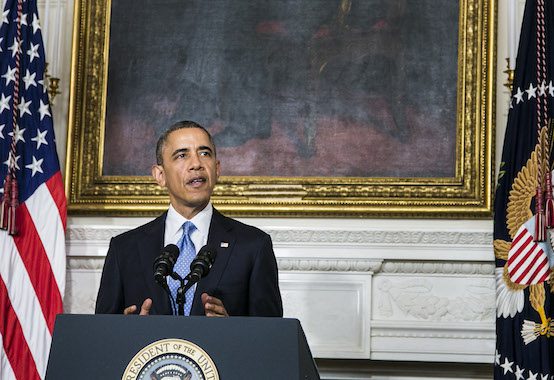What the Iran Deal Means for Republicans

Neoconservatives and others with fond memories of George W. Bush’s first-term foreign policy don’t like the Iranian nuclear deal. They doubt that it will stop Tehran from building a bomb. But they should appreciate its potential to halt their slide into irrelevance within the Republican Party.
Over the last few years, President Obama and his partisans have been the leading apologists for Bush-era warrantless wiretapping. When Obama launched an unauthorized war for regime change in Libya, 87 House Republicans voted with Dennis Kucinich to limit the scope of intervention.
Even more Republicans opposed Obama’s request for an “unbelievably small” war in Syria, including the GOP minority leader and whip in the Senate. Most conservative talk radio hosts were against it, along with grassroots Tea Party groups.
Many Republicans disliked applying sequestration to the defense budget, but they preferred it to tax increases. Danielle Pletka and Thomas Donnelly fretted ahead of the 2010 elections that “libertarians and Tea Party darlings” were going to transform the party into “a combination of Ebenezer Scrooge and George McGovern;” Pletka returned to this theme after Obama was re-elected.
The most hawkish conservatives follow a simple script: Obama is an apologizing appeaser while Republicans are the muscular party of Reagan and anyone to the right of Jimmy Carter. That narrative is complicated by the fact that they often side with the Obama administration—when they aren’t divided among themselves—against the rest of the right on military interventions and civil liberties questions.
Iran brings the foreign-policy debate back to the hawks’ comfort zone. The Iranian ayatollahs have been villains since at least the 1979 hostage crisis, much longer than Saddam Hussein was so perceived before the Iraq war. As a state sponsor of terrorism, it is not an undeserved reputation.
Muammar Gaddafi was equally infamous, but for many conservatives the question of whether to go to war hinged on their trust—or more precisely, lack of trust—in a Democratic president. For them, Syria also turned in part on wariness of Obama, as do drones and the national surveillance program.
This time around, the president isn’t asking conservatives to trust him with a humanitarian intervention. He is asking them to trust him with a nuclear agreement intended to prevent war.
Republican lawmakers, aided by Democrats like New Jersey Sen. Robert Menendez, are insisting on zero enrichment as a condition for relaxing any sanctions against Iran. Some would even like to authorize the use of military force. There are no partisan or opportunistic reasons for any Republican to resist such legislation.
In the Senate, Rand Paul—who has supported some sanctions—may be alone. If he decides to push back against Marco Rubio, John McCain, and Lindsey Graham this time around, it’s hard to envision Ted Cruz or even Mike Lee joining him.
Paul has sought to demonstrate that skepticism of U.S. interventionism doesn’t imply indifference to Israeli security. When it came to cutting foreign aid, he repeatedly said he “would begin with countries that are burning our flag and chanting ‘Death to America’” and hostile to Israel.
That will not be so easy a case to make with Iran. “The real Iran is what the leader of Iran, Khamenei, said yesterday,” argued Israeli Prime Minister Benjamin Netanyahu late last week. “He called Jews ‘rabid dogs’ and said that they were not human. The public responded to him with calls of ‘Death to America! Death to Israel!’”
The hawks’ op-eds and 2014 attack ads write themselves. Obama, John Kerry, and the mullahs are on one side, Israel and the GOP on the other.
Grassroots conservative sentiment will not necessarily be in favor of war, but it will be skeptical of any Obama-negotiated deal. Supporters of military strikes will repeatedly contend that sanctions relief comes before any Iranian concessions. The Tea Party isn’t going to buy Obama’s assurances to the contrary.
But if the gathering storm can hold off until a Republican is once again in the White House, why trust those whose foreign policy advice helped bring down the last Republican presidency and cost the GOP control of Congress?
Conservatives asking questions along those lines may struggle to be heard. It remains to be seen whether the Geneva talks set in motion anything that can roll back Iranian nuclear ambitions. There are good reasons to fear it will roll back Republican foreign policy more than a decade.
W. James Antle III is editor of the Daily Caller News Foundation and author of Devouring Freedom: Can Big Government Ever Be Stopped?
Comments